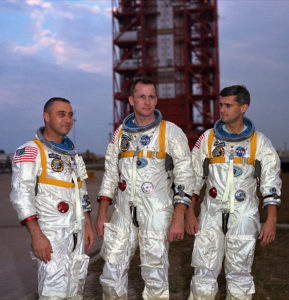Apollo 1
Andrew Chaikin
Tuesday, February 7, 2017 at 2:00 P.M. in the Pearl Young Theater
(video within Langley firewall only.)
Abstract
On January 27, 1967, NASA  experienced its first spaceflight disaster: The Apollo 1 fire, which took the lives of three astronauts during a practice countdown. The investigation into the accident revealed that the fire’s technical causes were shockingly obvious: The Apollo 1 command module had been filled with high-pressure, pure-oxygen at the time of the test. But what about the fire’s root causes? Fifty years later, these root causes can be seen with more clarity than was possible at the time, through analysis of historical records including oral histories, documents, memos, and other materials. Andrew Chaikin will discuss these root causes, which stemmed not as much from technical failures as from flawed modes of thinking by NASA managers, including a stunning failure to explore and understand flammability issues. Remarkably, the same kinds of attitudes, beliefs, and behaviors that led to the fire were also at the root of both the Challenger and Columbia shuttle disasters. Chaikin will explain why, 50 years later, the lessons of the Apollo fire are still relevant and still essential.
experienced its first spaceflight disaster: The Apollo 1 fire, which took the lives of three astronauts during a practice countdown. The investigation into the accident revealed that the fire’s technical causes were shockingly obvious: The Apollo 1 command module had been filled with high-pressure, pure-oxygen at the time of the test. But what about the fire’s root causes? Fifty years later, these root causes can be seen with more clarity than was possible at the time, through analysis of historical records including oral histories, documents, memos, and other materials. Andrew Chaikin will discuss these root causes, which stemmed not as much from technical failures as from flawed modes of thinking by NASA managers, including a stunning failure to explore and understand flammability issues. Remarkably, the same kinds of attitudes, beliefs, and behaviors that led to the fire were also at the root of both the Challenger and Columbia shuttle disasters. Chaikin will explain why, 50 years later, the lessons of the Apollo fire are still relevant and still essential.
Speaker
Space historian Andrew Chaikin is the author of numerous books and articles on space exploration, including A Man on the Moon: The Voyages of the Apollo Astronauts, widely regarded as the definitive account of the Apollo Moon missions. Writer-director and explorer James Cameron (Avatar, Titanic, Aliens of the Deep) has called him “our best historian of the space age.” Since 2011 he has been researching, writing, and teaching for NASA on principles of success in spaceflight. He has also been an advisor to NASA on space policy and public communications. Chaikin is a commentator for National Public Radio’s Morning Edition, and he has appeared on Good Morning America, Nightline, The Colbert Report, and the NPR programs Fresh Air and Talk of the Nation.